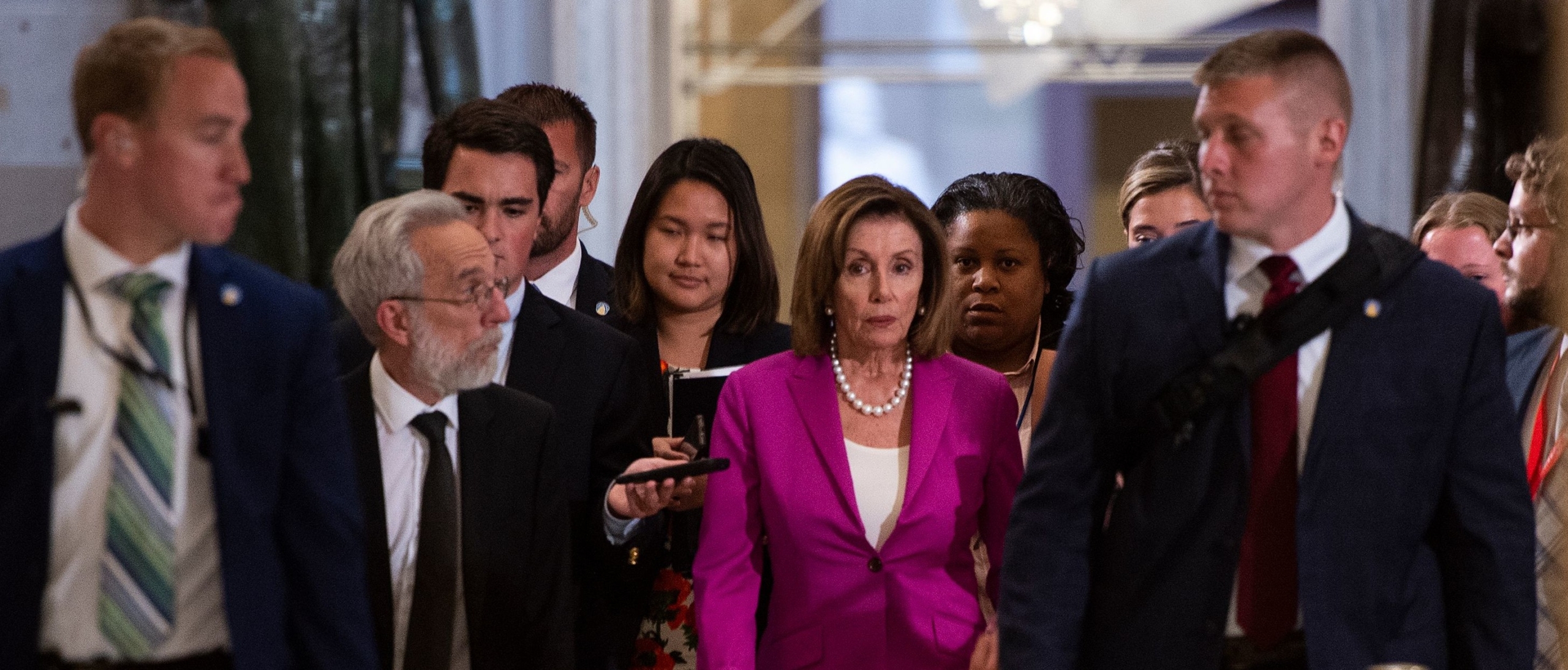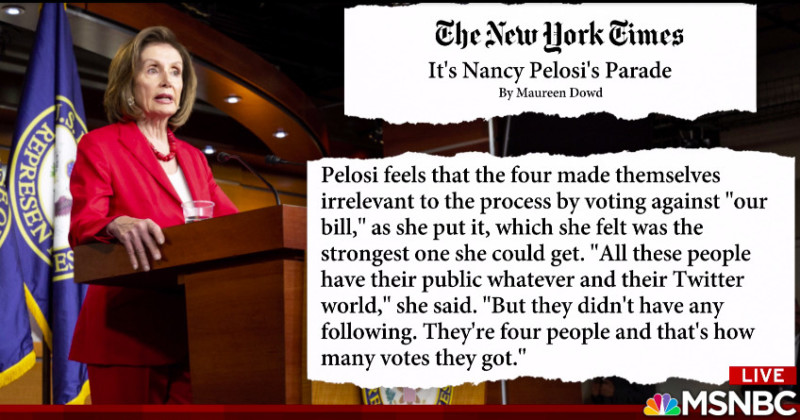Sign up for the daily CJR newsletter.
Before the House voted to condemn Donald Trump’s racist tweets on Tuesday, Republican Doug Collins of Georgia issued a formal objection to Speaker Nancy Pelosi’s speech, based on the rules of decorum in Jefferson’s Manual of Parliamentary Practice, which prohibit hissing, coughing, and spitting in the chamber, as well as calling the president racist. Collins asked that Pelosi’s remarks be struck from the record, briefly grinding the proceedings to a halt.
“I have cleared my remarks with the parliamentarian before I read them,” Pelosi replied testily, and then strode away from the podium.
From our CNN Public Editor: Turning to a racist to talk about racism
MSNBC carried the vote live on The Beat with Ari Melber, and the sense of watching history unfold was powerful. As Chris Matthews put it on Tuesday’s Hardball, “The vote posed as a reckoning for Republicans; it forced each of them to say on the record whether they condemned the president’s remarks or not.” It’s this reckoning that many observers of the US political scene have been waiting for, and it was mirrored by the change in tone on MSNBC.
KEEPING UP WITH THE FALLOUT from Pelosi’s decision to speak out against four popular progressive members of her caucus on July 6 has been like spending 10 days in a blender set to frappé. But the chaos unleashed by the conflict in the Democratic Party ended on an unexpected note of unity on Tuesday, as cable news, including MSNBC, followed the House Democrats’ lead and delivered a clear condemnation of the president.
The drama began in earnest last weekend, when Trump upended the political chessboard with a series of breathtakingly racist tweets attacking four newly elected progressive Democratic members of Congress, all of them young women of color: Rashida Tlaib, Alexandria Ocasio-Cortez, Ilhan Omar and Ayanna Pressley, a group now widely known in news media as the Squad. Maybe Trump meant to deflect attention from Robert Mueller’s appearance on Capitol Hill next week, or maybe he just wanted to carry on with his courtship of white nationalists—a staple of his tenure. Either way, cable news, MSNBC included, played into his hands.
In late June, Pelosi bowed to pressure from conservative Democrats and passed the Senate version of the $4.6 billion border funding bill, dropping her earlier bid for stronger protections for migrant children held at the border. Progressive Democrats, who saw it as a capitulation to the White House and Senate Republicans, were quick to condemn the move and the Speaker.
Ali Velshi opened Hardball on July 8 by promising to cover “the extraordinary public battle between Speaker Nancy Pelosi and some of the Democratic party’s most well-known liberals.” Three days later, on the same show, Steve Kornacki continued to characterize the Democratic conflict as a family feud, rather than a meaningful conflict worthy of sustained investigation and comment. “A freshman Democrat ups the ante in her ongoing feud with Speaker Nancy Pelosi. Why are newly elected progressives angry with the leader of their caucus?” he remarked; and later, “What did Speaker Pelosi have to say today about the increasingly public war of words threatening to divide her party?”
The problem here is the same one that has plagued political reporting, especially in recent years, and one that many news outlets vowed to fix in the wake of the coverage debacle of 2016: the framing of every story as a political spat or messaging battle, rather than as a serious and structural pitting of ideologies and policies against one another. The latter approach offers a story that is both textured and urgent, and gets to the heart of both why the Democrats are at war and why Trump is so eager to contrast himself with the new progressive congresswomen.
On July 10, All In’s Chris Hayes provided a counterpoint, showing how the coverage could actually work: “Now, Pelosi barely won a majority from her own caucus with 95 defections, over the fact the bill [put] no new constraints on DHS, Customs and Border Protection, or ICE behavior and standards of care.” Hayes’s factual, substantive remarks put the focus where it belongs: on the policy, not the personalities.
In general, though, Pelosi’s version of the dispute—as a squabble between young upstarts and a wise, experienced party boss—went unchallenged on MSNBC and most everywhere else in the media. Trump’s attacks on the four congresswomen came in the context of this frame—the adults scolding the children—and he escalated them all day Sunday and Monday.
It is either ironic or pathetic that it took the racist tweets from Trump to force outlets like MSNBC to reframe their coverage. “AMERICAN BLASPHEMY!” Chris Matthews yelled, at the top of his show (and lungs), on the subject of Trump’s attack on the “four impressive women.” “Not since Wilson showed Birth of a Nation in the White House have we seen racism like this!”
In a panel discussion, Matthews added: “Attacking those four women elevated them… [they were on the] front page of the Wall Street Journal, in color, right at the top: It looked like a scene out of the Bible. These were fabulous faces, a fabulous picture. He took them from being mavericks to being heroes of the nation, to many people.”
After this rollercoaster of a week, earlier calls for bipartisanship, such as Pelosi’s Sunday night tweet suggesting that Trump himself “should work with us for humane immigration policy that reflects American values,” appeared increasingly untenable. So did the similarly cautious both-sides-ism that has characterized so much of cable-news coverage in recent years.
Traditional journalistic ethics holds that “dispassionate distance is a virtue,” as Keith Woods, NPR’s vice president for newsroom training and diversity, put it in a recent essay. There’s no place in our work for openly calling something racist, Woods wrote: “That’s not what journalists do. We report and interview and attribute.” But from Woods’s essay, NPR linked out to a news story from its own Morning Edition: “‘Go Back Where You Came From’: The Long Rhetorical Roots Of Trump’s Racist Tweets.” There’s no agreement among media professionals as to how to manage our work fairly and truthfully in these incendiary times. But MSNBC has slowly become more willing to condemn the administration more explicitly. The language of distance and delicacy is based in good faith; where good faith is absent, delicate language does little more than normalize things like racism and cruelty. Even if you want to (one might ask why you’d want to), you can’t gavotte with those monsters from Stranger Things.
NEW AT CJR: Hong Kong journalists carry on through ‘one of the worst years’
Editors note: CJR has appointed its own outside public editors for four vital news outlets — The New York Times, The Washington Post, CNN and MSNBC — that currently lack any public ombudsman. You can reach them at publiceditors@cjr.org. (Any messages will be treated as off-the-record unless otherwise agreed.)
Has America ever needed a media defender more than now? Help us by joining CJR today.








